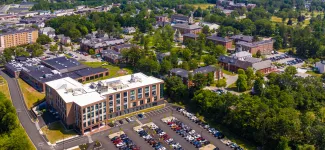
Over a dozen UNE researchers recently presented their work at the statewide Maine Public Health Association conference in Augusta
Just three months after its launch, the University of New England School of Public and Planetary Health (SPPH) is already demonstrating the strength of its interdisciplinary model — and its potential to shape public health practice across Maine.
UNE’s latest academic research body was strongly represented at the Maine Public Health Association’s (MPHA) recent annual conference in Augusta, where over a dozen SPPH faculty, researchers, and community partners shared ongoing outcomes from projects focused on rural health capacity, healthy aging, nutrition security, health policy, and workforce development in an era of critical need for health care professionals.
The MPHA is a statewide nonprofit that advocates, acts, and advises on critical public health challenges, aiming to improve the policies, systems, and environments that underlie health inequities and, ultimately, improve health outcomes for all people in Maine.
While the association’s conference served as a venue for presenting research, the breadth of UNE’s participation also offered members of Maine’s premier public health advocacy organization a first look at how the school’s mission is taking hold across disciplines and communities to understand — and improve — the conditions affecting the health and well-being of Maine’s 1.4 million residents.
“By bridging public health, environmental science, aging, and policy studies, we are creating a structure that reflects how real-world problems unfold,” said the school’s founding director, UNE Provost and Senior Vice President of Academic Affairs Gwendolyn Mahon, M.Sc., Ph.D. “The work shared at the MPHA conference illustrates how our faculty and students are already collaborating in ways that support Maine people, Maine communities, and the systems that sustain them.”
Launched in August, the UNE School of Public and Planetary Health unites expertise across the University’s programs in public health, marine and environmental sciences, business, medicine and the health professions, and supply chain management, among others, to prepare graduates to think and act across professional boundaries.
Additionally, SPPH’s academic centers — the Center for Public Health Practice and the Center for Healthy Aging — provide a home for applied research and community engagement that is rooted in the realities of Maine’s towns, coastal regions, and rural landscapes.
The work highlighted at the conference reflected that approach; rather than focusing on single-issue interventions, UNE presenters addressed health challenges as interconnected, community-level concerns.
Research findings demonstrated how building a much-needed health workforce begins with patient- and community-centered training.
Projects included efforts to strengthen clinical capacity in rural regions, support older adults aging in place, reduce children’s exposure to digital food marketing, and expand workforce training through experiential programs that pair learners with community-based organizations.
These initiatives showed how quickly SPPH is building momentum across research, education, and partnership, with projects stemming from long-standing UNE programs, including the Maine Area Health Education Center and its student scholars, and AgingME — the state’s $5 million, HRSA-funded Geriatrics Workforce Enhancement Program grant housed at UNE — and how they now benefit from being situated within a school intentionally built for interdisciplinary collaboration.
“Taken together, these contributions reveal an institution mobilizing its strengths toward a shared goal: improving health outcomes and strengthening the resilience of the communities we serve,” said John Vitale, Ph.D., dean of the Westbrook College of Health Professions and associate provost for Interprofessional Education. “What we’re seeing is a model of learning and research that is hands-on, community-rooted, and deeply team-driven.”
Faculty presenters also emphasized how SPPH’s integrative framework supports emerging professionals. Students involved in programs highlighted at the conference reported stronger confidence in collaborative problem solving and relationship-based care, skills Vitale said that are essential to addressing Maine’s evolving workforce needs.
Mahon noted that, while the school is still in its first year, its early footprint is notable, with faculty and students conducting applied research, building public-sector and clinical partnerships, informing policy discussions, and supporting healthier aging and stronger rural systems.
Mahon added that the school’s rapid progress reflects UNE’s broader commitment to interprofessional education and community partnership and will continue developing research programs and practice-based partnerships across the state to prepare future leaders in public health, clinical practice, and community development roles.
“Our charge is to equip students and faculty to work across disciplines and across sectors,” she said. “This is how we help meet the needs of Maine’s people and the environments in which they live.”